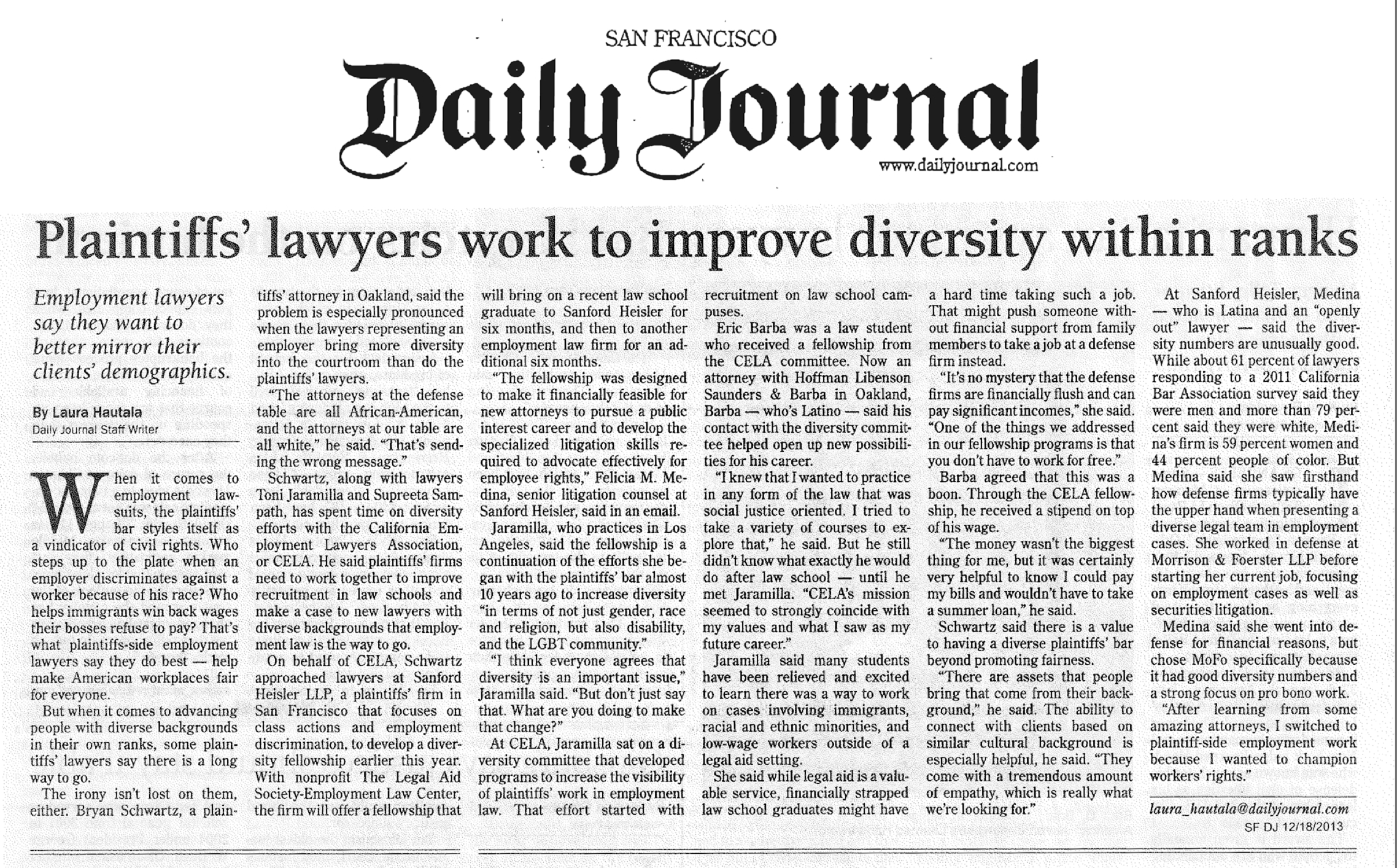Plaintiffs’ Lawyers Work to Improve Diversity within Ranks
Plaintiffs’ Lawyers Work to Improve Diversity within Ranks
Employment lawyers say they want to better mirror their clients’ demographics.
The Daily Journal, December 18, 2013
By Laura Hautala
When it comes to employment lawsuits, the plaintiffs’ bar styles itself as a vindicator of civil rights. Who steps up to the plate when an employer discriminates against a worker because of his race? Who helps immigrants win back wages their bosses refuse to pay? That’s what plaintiffs-side employment lawyers say they do best – help make American workplaces fair for everyone.
But when it comes to advancing people with diverse backgrounds in their own ranks, some plaintiffs’ lawyers say there is a long way to go.
The irony isn’t lost on them, either. Bryan Schwartz, a plaintiffs’ attorney in Oakland, said the problem is especially pronounced when the lawyers representing an employer bring more diversity into the courtroom than do the plaintiffs’ lawyers.
“The attorneys at the defense table are all African-American, and the attorneys at our table are all white,” he said. “That’s sending the wrong message.”
Schwartz, along with lawyers Toni Jaramilla and Supreeta Sampath, has spent time on diversity efforts with the California Employment Lawyers Association, or CELA. He said plaintiffs’ firms need to work together to improve recruitment in law schools and make a case to new lawyers with diverse backgrounds that employment law is the way to go.
Schwartz approached lawyers at Sanford Heisler LLP, a plaintiffs’ firm in San Francisco that focuses on class actions and employment discrimination, to develop a diversity fellowship earlier this year. The firm’s donation created a fellowship that will bring on a recent law school graduate to the Legal Aid Society-Employment Law Center for six months, and then to an CELA-member employment law firm for an additional six months. Schwartz’s non-profit, the Foundation for Advocacy, Inclusion and Resources, will administer the fellowship.
“The fellowship was designed to make it financially feasible for new attorneys to pursue a public interest career and to develop the specialized litigation skills required to advocate effectively for employee rights,” Felicia M. Medina, senior litigation counsel at Sanford Heisler, said in an email.
Jaramilla, who practices in Los Angeles, said the fellowship is a continuation of the efforts she began with the plaintiffs’ bar almost 10 years ago to increase diversity “in terms of not just gender, race and religion, but also disability, and the LGBT community.”
“I think everyone agrees that diversity is an important issue,” Jaramilla said. “But don’t just say that. What are you doing to make that change?”
At CELA, Jaramilla sat on a diversity committee that developed programs to increase the visibility of plaintiffs’ work in employment law. That effort started with recruitment on law school campuses.
Eric Barba was a law student who received a fellowship from the CELA committee. Now an attorney with Hoffman Libenson Saunders & Barba in Oakland, Barba – who’s Latino – said his contact with the diversity committee helped open up new possibilities for his career.
“I knew that I wanted to practice in any form of the law that was social justice oriented. I tried to take a variety of courses to explore that,” he said. But he still didn’t know what exactly he would do after law school – until he met Jaramilla. “CELA’s mission seemed to strongly coincide with my values and what I saw as my future career.”
Jaramilla said many students have been relieved and excited to learn there was a way to work on cases involving immigrants, racial and ethnic minorities, and low-wage workers outside of a legal aid setting.
She said while legal aid is a valuable service, financially strapped law school graduates might have a hard time taking such a job. That might push someone without financial support from family members to take a job at a defense firm instead.
“It’s no mystery that the defense firms are financially flush and can pay significant incomes,” she said. “One of the things we addressed in our fellowship programs is that you don’t have to work for free.”
Barba agreed that this was a boon. Through the CELA fellowship, he received a stipend on top of his wage.
“The money wasn’t the biggest thing for me, but it was certainly very helpful to know I could pay my bills and wouldn’t have to take a summer loan,” he said.
Schwartz said there is a value to having a diverse plaintiffs’ bar beyond promoting fairness.
“There are assets that people bring that come from their background,” he said. The ability to connect with clients based on similar cultural background is especially helpful, he said. “They come with a tremendous amount of empathy, which is really what we’re looking for.”
At Sanford Heisler, Medina – who is Latina and an “openly out” lawyer – said the diversity numbers are unusually good. While about 61 percent of lawyers responding to a 2011 California Bar Association survey said they were men and more than 79 percent said they were white, Medina’s firm is 59 percent women and 44 percent people of color. But Medina said she saw firsthand how defense firms typically have the upper hand when presenting a diverse legal team in employment cases. She worked in defense at Morrison & Foerster LLP before starting her current job, focusing on employment cases as well as securities litigation.
Medina said she went into defense for financial reasons, but chose MoFo specifically because it had good diversity numbers and a strong focus on pro bono work.
“After learning from some amazing attorneys, I switched to plaintiff-side employment work because I wanted to champion workers’ rights.”
What Our Clients
Say About Us
Contact Us*
Please click here to complete an intake form and begin our firm’s intake process. After submission we will reach out if further information is needed prior to us making a decision on whether we can assist at this time.




